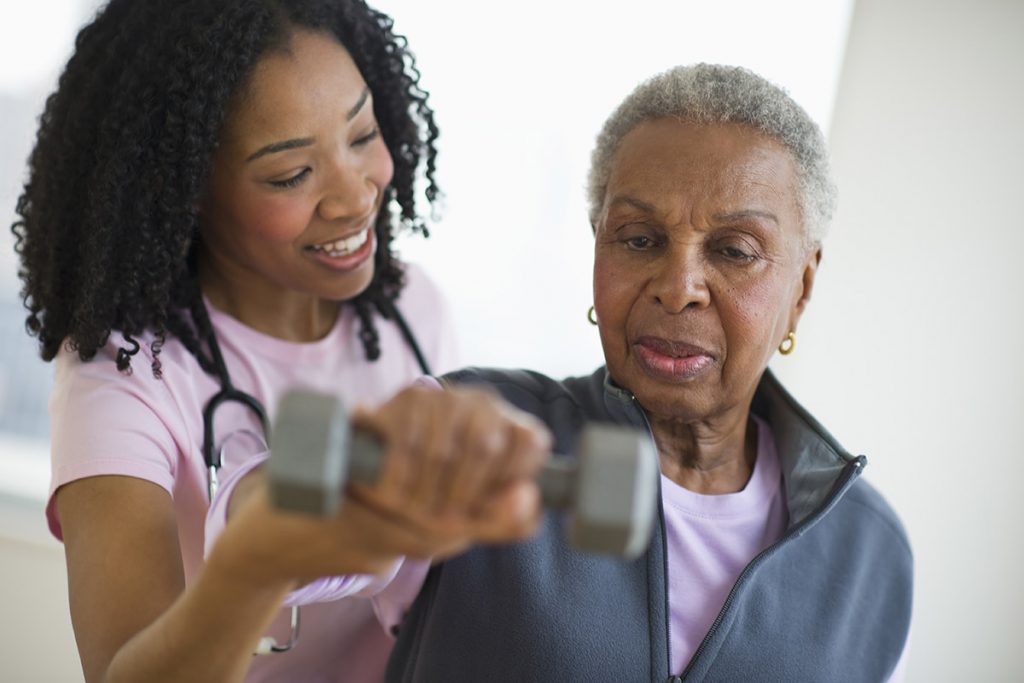Prehab: Your Guide to Successful Elective Surgery
What you do before a planned knee, shoulder, or hip replacement can be just as important as the rehabilitation you do afterwards.

If you’re facing elective surgery, like a knee, shoulder, or hip replacement, you probably expect to do rehabilitation, or rehab, after your procedure. Rehab can help you recover and regain your strength and mobility. But there’s a lesser-known step you can take before surgery to help your recovery go more smoothly. It’s called prehabilitation, or prehab.
Get and stay fit with SilverSneakers! Classes and events are happening daily at participating gyms, online through SilverSneakers LIVE, and at community centers near you. Activate your free online account to get started.
What is prehab?
Prehab is a process of preparing and training for surgery. This type of preparation can not only ease anxiety and empower you, but it also may help you recover faster and get back to doing all the things you love.
Research shows that the more you know about the surgery and recovery process beforehand, the better you’ll fare. In fact, prehab may reduce your number of post-op therapy visits by 30 percent.
What are the goals of prehab?
In general, the aim is to prepare your body and mind for the best possible recovery. The goals of prehab will vary depending on the surgery you’re having and your current health status.
More specific goals may be related to the following:
- Strengthening specific muscle groups
- Improving range of motion
- Lowering stress
- Losing or gaining weight
- Optimizing your diet
- Quitting smoking
- Setting up a post-surgery support system
Who is part of a prehab health care team?
Prehab can be a process you manage yourself, but it may be more effective if you’re able to consult with professionals.
Here are some of the practitioners who can be part of a prehab team:
- Primary care physician and/or surgeon
- Physical therapist or occupational therapist
- Registered dietician
- Psychologist or therapist
Why should older adults consider prehab?
Improving your strength, range of motion, and maybe even reducing your pain, will give you a better baseline to start from in recovery. This is especially beneficial for older adults because their muscles lose mass more quickly than they did when they were younger.
In one small study of older adults scheduled for hip replacement, those who did in-home training before surgery improved their leg strength and walking speed more than those who skipped the prehab.
Who benefits from prehab?
Anyone who is scheduled for surgery can benefit from prehabilitation. Increased physical activity, nutritional changes, and working on mental preparedness all improve your odds of a successful outcome.
In addition to orthopedic surgeries, patients preparing for pelvic floor surgery or cancer surgeries and treatments can also benefit from prehabilitation programs designed for their needs.
What does prehab involve?
Your surgeon can help customize a prehabilitation plan for you based on your diagnosis, type of surgery, and pre-existing health conditions.
While it’s always best to get personalized advice, the prehab strategies that apply to most older adults cover three areas: physical fitness, nutrition, and mental preparedness. These are discussed in more detail in the following questions.
How can I boost my physical fitness before surgery?
Being active in the weeks leading up to surgery is a great way to build strength and stamina, make exercise a habit, and up the odds of being active soon after the procedure. The goal is to move more than you do right now and to get your heart pumping every day.
Moderate-intensity activities like walking, biking, or swimming are great options. Gradually build up to longer exercise sessions by adding a few more minutes each day or week.
Beyond general exercise, prehab may also involve physical therapy before surgery and prepare you for post-surgery treatment. For example, a physical therapist can teach you rehab moves ahead of time, so you know what they’re supposed to feel like and which muscles they should activate.
Your therapist can also teach you to use adaptive equipment you’ll need post-op, like a walker, cane, or crutches, or devices that help with dressing or bathing.
Depending on your situation, you may benefit from a series of regular sessions. Or a therapist can put together a program you can follow at home.
Recommended reading: 7 Surprising Reasons to See a Physical Therapist
What nutrition strategies are involved in prehab?
Eating a nutritious diet before surgery will help get your body ready, fight infection, and even heal better after surgery.
For older adults, that means the following basic guidelines from MyPlate for Older Adults:
- Half of your plate should be fruits and vegetables of various colors
- A quarter of your plate should be grains—with an emphasis on whole grains
- The rest should be protein and low-fat or fat-free dairy products
It’s also smart to pay extra attention to your protein intake before surgery, aiming for at least 0.8 grams of protein per kilogram of bodyweight a day. For an adult who weighs 150 pounds, that’s about 54 grams of protein per day.
In addition to increasing your likelihood of a smooth recovery, protein helps maintain lean muscle mass, which supports the immune system and wound healing.
To see your recommended dietary allowance for protein, multiply your weight in pounds by 0.36, or use this online calculator. (Recommended reading: How Much Protein Should I Eat Each Day?)
Your doctor may also want you to lose or gain weight or control blood sugar levels before surgery. A registered dietician can help create a customized plan depending on your goals. You can also follow these strategies for how to lose weight after 65 here.
Some hospitals will check blood levels of a protein called albumin as part of your pre-op labs. Low levels of this protein often indicate malnutrition, which may lead to more complications post-surgery. If your levels are low, your doctor may ask you to add a protein supplement drink like Ensure to each meal.
How can I manage stress before surgery?
Heading into surgery with anxiety, depression, or low self-confidence is linked with worse surgical outcomes and a lower quality of life after the procedure is over. So, paying attention to your mental health before surgery is just as important as taking care of your physical health.
Many patients have success with mindfulness meditation, breathing exercises, or gratitude journaling. If you have acute anxiety symptoms related to your upcoming surgery, you may want to work with a psychologist or therapist to develop strategies to combat them.
Good to know: SilverSneakers members can take advantage of the 15-minute Mindfulness & Meditation Express online classes on SilverSneakers LIVE. You’ll learn strategies to train your awareness, improve mental clarity, and reduce stress. View the schedule and RSVP here.
Subscribe to our newsletter
It's quick and easy. You could be one of the 13 million people who are eligible.
Already a member? Click to discover our 15,000+ participating locations.
Follow Us
What else should I do to prepare for surgery?
Ask your surgeon ahead of time exactly what to expect—particularly in terms of pain and how to manage it. This can help you build the support system that’s best for your needs.
For example, you may need someone to drive you to appointments or prepare meals for you. Or you may need to stay with someone who has a ground floor bedroom until you’re able to climb stairs. Lining up family, friends, or neighbors who can help will put you at ease so you can focus on recovery.
If you are currently a smoker, try to take steps to quit before surgery, because smoking increases the risk for surgical complications.
How can SilverSneakers help with prehab?
Even if you’re not following a specific prehab program, you can still prepare for surgery by exercising regularly. SilverSneakers instructors are trained in the health needs of older adults. The classes are designed for seniors, and trainers know how to modify exercises based on your individual needs.
Let the instructor know what your goals and limitations are, and they will happily help you. For SilverSneakers LIVE online classes, you can use the chat function to message instructors.
Recommended reading: 11 Burning Questions About SilverSneakers—Answered!
When should prehab start?
Ideally, you would start a prehabilitation program six to 10 weeks before surgery, but anything is better than nothing. If you’re scheduled for surgery in two weeks, you can still benefit by starting now.
Recommended reading: 4 Things Every Older Adult Should Do Before Surgery
What might prehab cost?
Prehab programs and protocols are not yet standard practice throughout the healthcare system, so it is not always covered by insurance. Check to see what your doctor or hospital offers and what your insurance plan covers.
If you have a limit on the number of physical therapy sessions related to your surgery, you can book just a session or two and ask the physical therapist to develop a home program you can follow. If your hospital doesn’t have much to offer, you can put together a plan that works for you by following suggestions in this article.
Recommended reading:
8 Steps You Should Take After a Hip Fracture
New Knee? Here’s What to Expect from Your Recovery
6 Dos and Don’ts After Shoulder or Wrist Surgery
See our sources:
Prehab helps reduce the number of inpatient postoperative stays: Clinical Orthopaedics and Related Research
Strong for Surgery Program: American College of Surgeons
How to get prehab: Arthritis Foundation
Preparing for Surgery: American Academy of Orthopaedic Surgeons
Check Your SilverSneakers Eligibility Instantly
SilverSneakers members can go to thousands of gyms and fitness locations across the nation, plus take SilverSneakers LIVE online classes that are designed for seniors of all levels. If you have a Medicare plan, it may include SilverSneakers—at no additional cost. Check your eligibility instantly here.
Already a member? Get your SilverSneakers member ID and exclusive fitness content by activating your online account here.
Not eligible for SilverSneakers? You can still get 200+ free SilverSneakers On-Demand videos and stay in touch with us by creating your online account.





